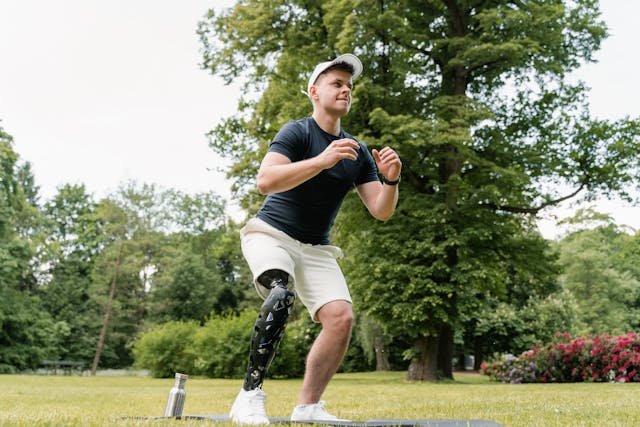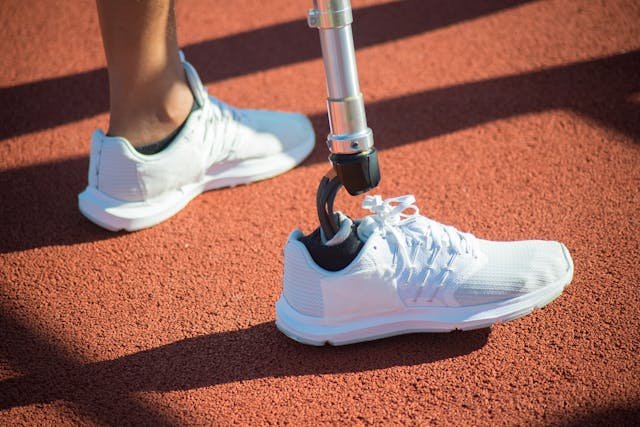Every parent wants their child to feel safe, included, and supported at school and in daily activities. For children with prosthetic limbs, this support becomes even more important. Teachers and caregivers play a huge role in making sure your child can participate fully—whether it’s in the classroom, during playtime, or in extracurricular activities.
Having open, clear conversations with teachers and caregivers about your child’s prosthetic needs helps create an environment where your child can thrive. However, many parents feel unsure about how to approach these conversations or what information to share.
At Robobionics, we understand that educating others about prosthetic needs can feel overwhelming. This guide will help you talk to teachers and caregivers confidently, ensuring that your child gets the support they need to feel comfortable, independent, and included.
Why Talking to Teachers and Caregivers is Important
Teachers, school staff, and caregivers interact with your child every day. The more they understand about your child’s prosthetic limb, the better they can support their learning, movement, and social interactions.
Ensuring a Safe and Inclusive Environment
Children with prosthetic limbs may have specific needs related to movement, comfort, and participation in activities. If teachers and caregivers are unaware of these needs, they may struggle to provide the right support.
For example, a child with a prosthetic leg may need extra time to climb stairs or walk between classes, while a child with an upper-limb prosthetic may need modifications for writing or using school materials. By sharing this information early, you help create a safe, inclusive space where your child feels supported.
Encouraging Confidence and Independence

Children feel more confident and capable when their teachers and caregivers understand their prosthetic and support their independence. If adults know how to help when needed—but also allow the child to do things on their own—it empowers the child to develop skills and self-reliance.
Teachers who understand prosthetic needs can also encourage classmates to be inclusive, helping to prevent feelings of isolation or frustration.
Avoiding Misunderstandings and Assumptions
Without guidance, teachers and caregivers may not know what is best for your child. Some may offer too much assistance, making the child feel different, while others may not recognize when help is needed. By having a clear conversation upfront, you set expectations and ensure your child gets the right balance of support and independence.
Preparing for the Conversation
Before meeting with teachers or caregivers, it helps to plan ahead. Organizing your thoughts and deciding what key points to cover ensures that the conversation is smooth, productive, and informative.
Understanding Your Child’s Specific Needs
Every child is different, and so are their prosthetic requirements. Some may need physical support for mobility, while others may need help with fine motor skills. Think about:
- Does my child need extra time to move between classrooms or playground areas?
- Do they need modifications for activities like writing, using scissors, or playing sports?
- Are there any situations where they may need assistance, such as fastening a prosthetic strap?
Listing these specific needs helps ensure you cover everything that’s important in your discussion.
Gathering Helpful Resources

Many teachers may not have experience working with children who use prosthetics. Bringing simple, easy-to-understand resources—such as a short guide, diagrams, or a video explaining how your child’s prosthetic works—can make the conversation more effective.
Some parents also write a short document with key points, such as:
- Basic details about the prosthetic limb and its function
- Daily challenges and how to overcome them
- Things the teacher should and shouldn’t do
This helps teachers refer back to important information whenever they need guidance.
Involving Your Child in the Discussion
If your child is old enough, include them in the conversation. Letting them explain their needs in their own words helps build their self-advocacy skills. It also ensures that teachers hear directly from the child about what makes them feel comfortable.
You can ask your child:
- “What do you want your teacher to know about your prosthetic?”
- “Are there any activities at school where you feel like you need more help?”
- “How do you want your friends and teachers to treat you?”
Encouraging them to speak up builds confidence and helps teachers understand their perspective.
Key Topics to Discuss with Teachers and Caregivers
When talking to teachers and caregivers, focus on the most important points while keeping the conversation simple and clear.
1. Basic Information About the Prosthetic Limb
Start by explaining what type of prosthetic your child uses and how it affects their daily activities. Teachers don’t need a deep medical explanation, but they should understand:
- Whether the prosthetic is for an arm, leg, hand, or foot
- If it has any special features or limitations
- How it impacts movement, balance, or dexterity
For example, if your child uses a myoelectric arm, the teacher should know that it’s controlled by muscle signals and requires careful handling. If they wear a prosthetic leg with a joint, the teacher should understand that certain movements, like running, may be more challenging.
2. Mobility and Physical Activity Considerations

Discuss how the prosthetic affects movement and physical activities. Important points to cover include:
- Does your child need extra time to move around the classroom or playground?
- Are there certain activities they may struggle with, such as climbing stairs or sitting for long periods?
- Can they participate in sports and physical education normally, or do they need modifications?
If your child plays sports, let the teacher know what adjustments can be made to ensure they are included in physical activities without discomfort.
3. Handling Emergencies and Prosthetic Care
Teachers and caregivers should know what to do if the prosthetic becomes loose, uncomfortable, or damaged. Explain:
- How to tell if the prosthetic needs adjustment (e.g., if your child complains of pain or discomfort).
- What to do if the prosthetic falls off or breaks during school hours.
- Whether your child needs help adjusting straps or putting the prosthetic back on.
Providing a small emergency kit with extra padding, straps, or tools (if needed) can help teachers assist your child quickly in case of an issue.
4. Social Inclusion and Peer Interactions
One of the biggest concerns for many parents is how their child will be treated by classmates. Talk to teachers about:
- Encouraging inclusive play and group activities.
- Helping classmates understand the prosthetic without making it a big deal.
- Teaching children how to ask respectful questions instead of staring or making insensitive comments.
Some parents offer to do a short class presentation (with their child’s permission) to explain the prosthetic limb in a fun, engaging way. This can help reduce curiosity and normalize the prosthetic.
Regular Check-Ins and Follow-Ups with Teachers and Caregivers
Once you’ve had the initial conversation about your child’s prosthetic needs, it’s important to stay connected and ensure that everything is going smoothly.
Scheduling Follow-Up Meetings

A few weeks after the first discussion, schedule a follow-up meeting to check in on your child’s progress. Ask teachers and caregivers:
- “Have there been any challenges with my child’s prosthetic at school or daycare?”
- “Do you feel they need any additional support or adjustments?”
- “Is my child participating fully in all activities, or are there any barriers we can work on together?”
These follow-ups help identify small issues before they become bigger problems. If needed, adjustments can be made—such as modifying classroom setups, adapting activities, or helping classmates understand the prosthetic better.
Encouraging an Open-Door Policy
Make sure teachers and caregivers know that they can reach out anytime if they have concerns or questions. Let them know the best way to contact you—whether it’s through email, phone, or a communication notebook that goes back and forth between school and home.
This open-door policy ensures that your child’s needs are always being met, even as they change throughout the school year.
Checking in with Your Child
Beyond talking to teachers and caregivers, regularly check in with your child about their experience. Ask them:
- “Do you feel comfortable in class and during activities?”
- “Is there anything you wish your teacher knew about your prosthetic?”
- “Are your friends treating you well and including you in games?”
Encouraging honest conversations with your child helps ensure that they feel heard, supported, and empowered in their school environment.
Helping Schools and Caregivers Become More Inclusive

While many teachers and caregivers are willing to help, some may not have experience working with children who use prosthetics. Providing education and guidance can help them become better allies in supporting your child’s independence.
Providing Learning Resources for Teachers and Staff
If your child’s teacher or caregiver is new to working with prosthetic users, consider sharing:
- Videos or articles about how prosthetic limbs work.
- Simple instructional guides on handling prosthetic-related needs.
- Contact details for a prosthetist or rehabilitation specialist who can offer advice.
At Robobionics, we are always happy to help schools and caregivers understand prosthetic technology and care. Parents can direct teachers to resources or even set up a short session with an expert to answer any questions they may have.
Encouraging Disability Awareness at School
Some schools organize disability awareness programs to help students and teachers understand different physical abilities. Parents can suggest:
- A classroom presentation (with your child’s permission) to explain the prosthetic in a fun, engaging way.
- A disability awareness week where students learn about inclusivity.
- Adaptive sports or activities that allow all children to participate equally.
These initiatives normalize prosthetic use and encourage classmates to see beyond differences.
Promoting an Inclusive Mindset in Care Settings
For caregivers at daycare centers, after-school programs, or sports clubs, parents can suggest small but meaningful changes, such as:
- Ensuring play areas and seating arrangements are accessible.
- Encouraging all children to participate in games, regardless of ability.
- Using language that emphasizes ability rather than limitation.
Even small adjustments can make a big impact in helping your child feel fully included in every environment.
Handling Challenges and Advocating for Your Child

Even with the best planning, challenges may arise. Some teachers or caregivers may unintentionally overlook your child’s needs, while others may not understand how to best support them.
Addressing Misunderstandings with Patience
If you notice that a teacher or caregiver is not providing the right support, approach the conversation with understanding and a problem-solving mindset. Instead of assuming resistance, ask:
- “I noticed my child is struggling with [specific issue]. How can we work together to improve this?”
- “I’d love to share some ideas that might make things easier for both my child and the classroom. Would that be helpful?”
Most teachers and caregivers want to do their best, and a collaborative approach often leads to better results.
Speaking Up if Your Child Faces Exclusion
In rare cases, a child with a prosthetic may be excluded from activities or treated differently due to lack of awareness or misunderstanding. If this happens, don’t hesitate to advocate for your child’s rights.
If necessary, speak to:
- The teacher or caregiver first to see if the issue can be resolved directly.
- The school principal or program director if further support is needed.
- A prosthetist or disability rights advocate who can provide guidance on legal rights and inclusivity.
Your child deserves to be fully included and supported, just like any other child.
Celebrating Progress and Building Your Child’s Confidence

When teachers and caregivers actively support your child, it’s important to acknowledge and appreciate their efforts. A simple thank-you note or message lets them know that their support is making a difference.
Recognizing Your Child’s Growth
As your child becomes more independent and confident, celebrate their progress. Whether they:
- Learn to manage their prosthetic without help.
- Join a new activity with confidence.
- Feel comfortable explaining their prosthetic to classmates.
every achievement, big or small, is a step toward a future of independence.
Encouraging a Positive Attitude Toward Prosthetic Use
Help your child see their prosthetic as a tool that empowers them, not something that holds them back. Remind them:
- “Your prosthetic helps you do amazing things—there’s nothing you can’t achieve.”
- “Everyone has different abilities. Your prosthetic is just one part of what makes you unique.”
- “You are strong, capable, and can accomplish anything you set your mind to.”
Building this positive mindset early helps them navigate school and life with confidence and resilience.
Final Thoughts: Creating a Supportive Team for Your Child
When teachers and caregivers understand your child’s prosthetic needs, they become powerful allies in helping your child feel confident, included, and capable. A supportive team—built through open communication, clear guidance, and teamwork—ensures that your child can fully participate in school and daily activities without unnecessary struggles.
At Robobionics, we believe that every child deserves to thrive with confidence and independence. By talking to teachers and caregivers in a clear, positive, and proactive way, you help create a world where prosthetics are accepted and supported.
🚀 Need expert advice on making daily life with a prosthetic easier? Book a free consultation with our team today!
💡 Have questions about your child’s prosthetic care and school support? Contact us now, and let’s work together to create the best environment for your child!



